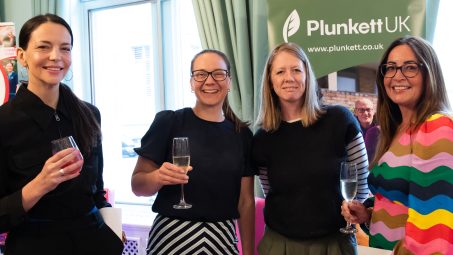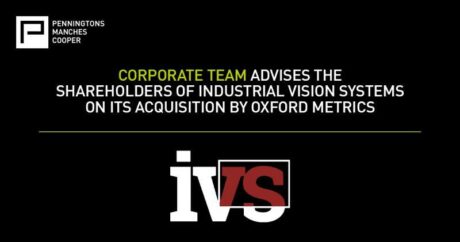
Attracting and retaining global talent in an uncertain future
While many of Oxford’s tech spinout businesses have thrived thanks to access to investment funds, the vote to leave the European Union presents new challenges in terms of labour mobility and talent acquisition, vital issues for a start-up.
Oxford prides itself as a fast-growing international city with 28% of its residents born outside the UK, according to Oxford City Council. For Oxford University, a major employer in the city, the pace of globalisation has accelerated in recent decades: 41% of students and 48% of academic staff come from outside the UK. And much of the ground-breaking technology innovation that comes from Oxford, ranked as the world’s top medical research university, is the result of close research collaborations with international partners.
Since 1997, Oxford University Innovation has spun out a new company based on academic research every two months on average, and five are currently listed on London’s AIM market. This activity has been facilitated by the surge in finance available from investors who recognise their commercial potential and help the spinout companies clear the “valley of death” in which many previously failed due to lack of funds. However the vote to leave the European Union threatens to pose a new challenge for Oxford’s spinouts.
The status of EEA nationals (EU plus Norway, Liechtenstein and Iceland) who are currently working in the UK will be uncertain for the next few years whilst the Article 50 exit process is followed. The government has refused to give assurances to them even though all MPs seem keen for them to be allowed to stay.
Post-Brexit the UK government would in principle be free to apply any criteria (e.g. salary, skill level, language) which it thinks valuable in order to determine which EEA workers should be allowed to remain in the UK. But in order to ensure similar treatment of UK nationals in other countries, it intends to seek to agree a common approach with the EU as part of the Brexit transitional deal. If no agreement is reached, then the UK can impose whatever tests it wants, generous or otherwise, on current EU workers in order to decide who should stay, but it runs the risk that UK workers will be treated in a harsher fashion by the EEA countries where they are living at the date of Brexit
According to Duncan Bain, immigration expert at Penningtons Manches LLP, the uncertainty is particularly great for UK businesses employing EEA scientists because they are likely to be difficult to replace and cross-EEA working is common. This causes concern for research-based spinouts and their investors, who may even consider locating the business in another EEA state to reduce risk.
Take the hypothetical case of Hans, a German post-doctoral researcher who has lived in the UK for six years and been employed by the University for the past three. Hans is working with a British colleague, Harry, on research which they are ready to commercialise and they are at the planning stages of a University-supported spin out. Hans and his investors now need to consider:
What chance is there that Hans will be allowed to remain in the UK once Brexit takes place?
A key issue is whether Hans can show that he has ‘permanent residence’ status so that he can qualify for British Citizenship.
Will any EEA junior scientists that the business might want to recruit be able to remain in the UK after Brexit?
They will be more vulnerable, particularly in the case of any who have recently arrived.
How well will the start-up be able to source talent for the scientific work that it wishes to do post Brexit?
Post-Brexit immigration rules are likely to allow high skilled migration but salary thresholds and administrative burdens are likely to be significant concerns.
Will locating the start up in another EEA state reduce the staffing anxieties?
Yes, as the EEA has a wider staffing pool, but British colleagues such as Harry will have no automatic rights.
The permanent residence status that Hans needs can be more complicated than many people realise and may involve providing substantial evidence. Many organisations in Oxford and the Thames Valley are likely to be impacted by this issue, and would be wise to consider providing guidance and support to affected staff to help them protect their positions and to retain vital talent in the workforce.
More in Recruitment

The Core Values Driving Nicholsons: Creativity, Passion, and Dedication
At the heart of Nicholsons lies a team of over 200 individuals, bound together by shared values that shape every aspect of their work. These values—creativity, passion for the planet, and dedication—are not just words but guiding principles that drive innovation, sustainability, and customer-focused solutions.

Spotlight on Helen Fallon: Driving Success in Recruitment and Beyond
Helen Fallon, the dynamic Managing Director of Global CTS Ltd, is a cornerstone of the B4 community, bringing unparalleled expertise and infectious enthusiasm to every endeavour. With over 25 years of experience in the recruitment industry, Helen’s approach combines practicality, innovation, and sincerity—qualities that have earned her widespread respect among her peers and clients alike. It’s also gained her a unique accolade being named the first Raise Founding Partner – see more below.

Schneider Electric Names Chris Leong as Chief Sustainability Officer
Schneider Electric, a global leader in energy and automation digital solutions, has announced the appointment of Chris Leong as its new Chief Sustainability Officer. This strategic move underscores Schneider Electric’s commitment to sustainability and innovation in driving energy efficiency and decarbonisation.
From this author

PENNINGTONS MANCHES COOPER ADVISES THE SHAREHOLDERS OF OXLID ON ITS ACQUISITION...
The corporate team at Penningtons Manches Cooper has advised the shareholders of UK-based OXLiD on its acquisition by AIM listed Anglo-Australian battery innovator, Gelion.

PENNINGTONS MANCHES COOPER APPOINTED AS LEGAL ADVISOR TO ADVANCED RESEARCH +...
Penningtons Manches Cooper’s Birmingham and Oxford offices have been appointed as legal advisors to the Advanced Research + Invention Agency (ARIA), a new R&D agency built to unlock scientific and technological breakthroughs to benefit everyone.

PENNINGTONS MANCHES COOPER ADVISES THE SHAREHOLDERS OF MACHINE VISION TECHNOLOGY SPECIALISTS...
The corporate team at Penningtons Manches Cooper has advised the shareholders of machine vision technology specialists Industrial Vision Systems on its acquisition by Oxford Metrics PLC (LSE: OMG).

